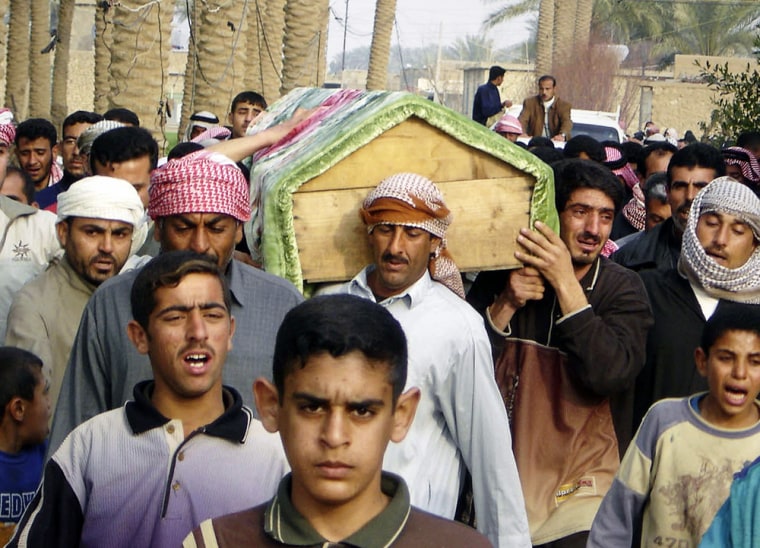The U.S. military said on Thursday it had uncovered a death squad operating from Iraq’s Shiite-run Interior Ministry and targeting Sunni Muslims, and said the Interior Ministry was investigating.
U.S. military spokesman Major General Rick Lynch said four traffic policemen were being held at the U.S.-run Abu Ghraib jail over the incident and that the Interior Ministry was investigating in conjunction with the U.S. military.
“As we understand it, based on interrogation of individuals and the authorities that are involved, there were 22 individuals all told and they were members of the Iraqi highway patrol and at the point of the event they were dressed as Iraqi highway patrolmen,” he told a press briefing in Baghdad on Thursday.
“Only four of those individuals were planning to conduct a kidnapping and subsequent murder of a Sunni individual, only four of them, and those four are now at Abu Ghraib.”
He said there was no evidence that the men detained had conducted similar operations in the past, though he did not rule the possibility out.
The Interior Ministry was not available for comment. The incident, if confirmed, adds to a growing body of evidence against Iraq’s Shiite-run security forces, which have been the focus of complaints by the Sunni Arab minority for months.
Accusations from Sunni Arabs
Sunni Arabs, who ruled under toppled strongman Saddam Hussein but have been marginalized since the U.S.-led invasion of 2003, have accused the Interior Ministry, run by a powerful Shiite Muslim party, of sanctioning anti-Sunni death squads.
Bodies of Sunni Arabs, often bound and shot in the head, have been turning up in roadside ditches and rubbish dumps since early 2005, greatly aggravating sectarian tensions in a country already racked by relentless bloodshed.
U.S. and Iraqi forces have detained thousands of Iraqis, most of them Sunni Arabs, in an effort to suppress the Sunni-led insurgency that has raged since late 2003 and which has killed thousands of U.S. and Iraqi troops and civilians.
The detentions have heightened Sunni Arab ire, inflamed by the discovery late last year of a secret bunker at the Interior Ministry that was packed mostly with Sunni Arab detainees, the bulk of whom showed signs of malnourishment and torture.
The pro-Iranian Supreme Council for the Islamic Revolution in Iraq (SCIRI), one of two main parties in the Shiite alliance that won December elections, controls the Interior Ministry.
Sunnis have accused SCIRI’s military wing, the Iranian-trained Badr Brigades, of running the squads.
The government and Badr deny the charges.
Lynch did not comment specifically on the Badr Brigade’s role in the incident or in the Interior Ministry overall, but admitted Iraqi security forces were infiltrated by militias.
As well as probing individual incidents, the Interior Ministry was investigating whether there was a widespread problem that would allow them to recur, Lynch said.
Men admitted plan
The Chicago Tribune on Thursday quoted U.S. Maj.-Gen. Joseph Peterson as saying the discovery of the plot came by chance when 22 men were stopped at an Iraqi Army checkpoint and admitted when asked that they planned to kill a Sunni Arab.
“There is no denying that there are militias present in Iraq and that some of those militia forces have displaced loyalties and some of those militia forces have indeed integrated with the Iraqi security forces and that’s what happened in that incident,” Lynch said.
“Those kinds of incidents could indeed inflame passions across Iraq and we’re watching that very closely.”
